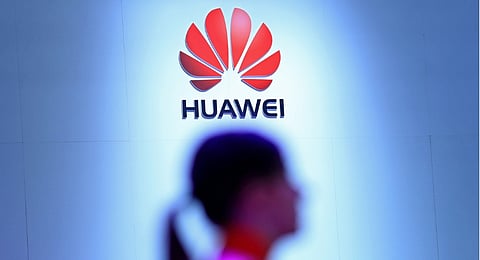The executive order under consideration, for possible issuance in February, wouldn't mention specific companies like Huawei and wouldn't ban US sales by the firms, according to a person familiar with the matter. But it would empower the Commerce Department to review products and purchases by companies connected to adversarial countries, including China, this person said. A bipartisan bill recently introduced in Congress would take the more draconian step of banning sales of US parts to Huawei and its Chinese counterpart, ZTE Corp., which could drastically curtail their businesses. Another bill would set up a White House office to coordinate federal efforts to blunt technology threats from China.
The Trump administration is also stalking Huawei in other ways. Its most provocative act so far was asking Canada to arrest Huawei's chief financial officer, Meng Wanzhou, in Vancouver last month on fraud charges linked to alleged Iran sanction violations, which Huawei denies. Meng, the daughter of Huawei founder Ren, is out on bail awaiting possible extradition to the US. Her arrest "would never, never, ever have happened" before the Trump pivot to confronting China, says Spalding, the retired Air Force general. "What you're seeing is the beginning of a change in how the federal bureaucracy treats China."
Elsewhere, US investigators in Seattle are looking into possible criminal charges against Huawei for alleged theft of trade secrets from US partner T-Mobile US Inc. The probe includes allegations that a Huawei engineer stole information when visiting a T-Mobile lab in Bellevue, Washington, to see a diagnostic robot called "Tappy" that simulated a person's phone use, according to one person familiar with the matter. In a 2014 lawsuit, T-Mobile alleged a Huawei engineer slipped one of the robot's fingertips into his laptop bag during the visit and left with it. The jury sided with T-Mobile in 2017, saying T-Mobile should get $4.8m in damages for breach of contract. The parties later agreed to drop the case after settlement talks.
China's foreign ministry said on Jan. 17 that the legal dispute between Huawei and T-Mobile was resolved in court and expressed concern about the motives behind the "reinvestigation."
On Jan. 11, authorities in Poland arrested a former Polish intelligence official and a Chinese employee of Huawei and accused them of spying for China. Huawei fired the employee the next day and said the incident brought disrepute upon the company.
In other foreign capitals, US officials are playing hardball over Huawei, warning allies that the US will reevaluate what intelligence it shares with them if they don't end cooperation with the company, according to an American official. US officials, mindful of Huawei's market advantages, are even trying to develop packages of US-made gear to provide foreign companies an alternative to buying Huawei, according to an official involved in that effort.
The campaign to blunt Huawei's rise appears to be one of Trump's most successful diplomatic initiatives. Australia, New Zealand and Japan have acceded to US requests to bar Huawei's 5G equipment. The allies have also banded together to provide aid to the Solomon Islands and Papua New Guinea to enable them to reject a Huawei submarine cable carrying broadband connections, saying the line represents a national security threat at its connection point in Australia.
In Britain, BT Group Plc has been pulling Huawei equipment out of its core structure since the 2016 acquisition of mobile carrier EE Ltd., which used Huawei gear throughout its systems. It's also removing Huawei products from the emergency-response network that EE is building in Britain. Germany has said it is considering restricting Huawei's role in its future telecom infrastructure, while Czech officials have expressed concerns that China is preparing an economically damaging reprisal against the country after Czech authorities issued warnings about Huawei's risk to national security.
France's government has been warning about Huawei for some time, according to Orange SA CEO Stephane Richard, who said the company will work with Ericsson AB and Nokia Oyj, not Huawei, on its 4G and 5G networks. Following the arrests in Poland, officials there urged the European Union and the North Atlantic Treaty Organization to find a common approach toward Huawei, rather than leave it to each country to act alone and face possible Chinese retribution.
Some apparent Huawei misconduct isn't classified. Every night for five years, equipment installed in the Chinese-built headquarters of the African Union in Addis Ababa, Ethiopia, transmitted data from midnight to 2am back to servers in Shanghai, according to an investigation published a year ago in the French newspaper Le Monde. Subsequently, microphones hidden in desks and walls were stripped from the $200m building, which was financed by China, and Huawei's servers were replaced, according to a report by the Australian Strategic Policy Institute. After the Le Monde report, China called the espionage allegations "ridiculous,'' and Ebba Kalondo, a spokesperson for the African Union Commission, says it was a "non-story."
Huawei's English website still boasts of the "greatly enhanced security" its systems provided the Addis Ababa headquarters. The African Union's "legacy PCs were proving too vulnerable to hackers, phishing, viruses, and other forms of compromise,'' one Huawei post explains.
Bonnie Girard, who lived in China for a decade while working for a string of European telecom companies, remembers visiting a contract manufacturer in the mid-1990s and seeing Huawei engineers brazenly photographing printed circuit boards being built for Alcatel. The Huawei employees could never have accessed the facility without government approval, says Girard, who now runs consulting firm China Channel Ltd.
Still, Huawei has always been completely transparent with Eastern Oregon Telecom about its hardware and software, says Frannel, the CEO. He says he's never seen "a shred of evidence that would indicate to me that Huawei is a problem." And in today's global economy, US and European suppliers rely on Chinese-made parts nearly as much as Huawei does, he adds. "Banning a brand doesn't solve our security problem."

